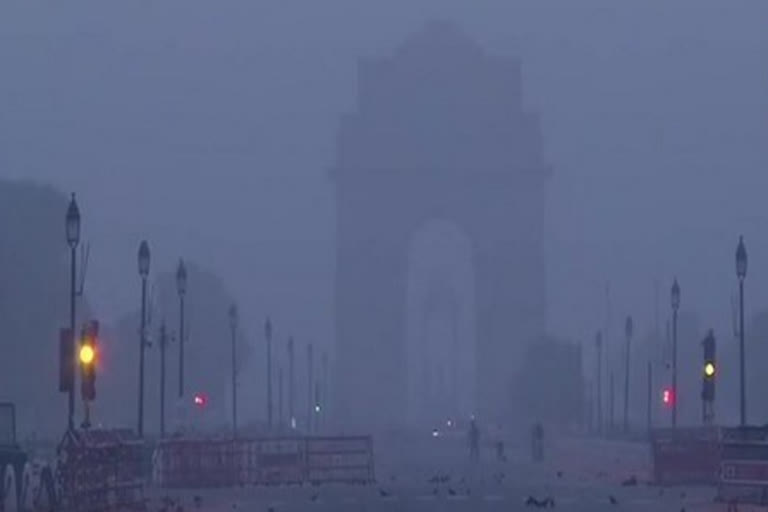New Delhi: As Delhi's air quality index (AQI) remains a notch short of entering the "severe plus" category, the central Commission of Air Quality Management (CAQM) on Thursday directed authorities to ban the plying of four-wheeler diesel light motor vehicles in Delhi and adjoining NCR districts and the entry of trucks into the capital.
The step is a part of anti-pollution measures under the final stage of the Graded Response Action Plan (GRAP). However, BS-VI vehicles and those used for essential and emergency services are exempted, according to an order issued by the Commission for Air Quality Management. The order stated that the state government may take a call on the closure of educational institutions, non-emergency commercial activities, and plying of vehicles on an odd-even basis.
As per the order, the Central and state governments may decide on permitting work from home. "Ban on plying of 4-wheeler diesel LMVs in NCT of Delhi and Districts of NCR bordering Delhi, except BS-VI vehicles and vehicles used for essential/emergency services," the order read.
The CAQM also ordered a ban on Delhi-registered diesel-run medium and heavy goods vehicles in the capital. Those carrying essential commodities and providing essential services are exempted. The entry of trucks other than electric and CNG ones in Delhi is banned too. Those carrying essential commodities are exempted.
The CAQM also directed closure of all industries running on non-clean flues in the region, "even in areas which do not have PNG infrastructure and supply". Delhi's 24-hour average AQI stood at 450 on Wednesday. An AQI of above 400 is considered "severe" and can affect healthy people and seriously impact those with existing illnesses.
What all will be affected as GRAP stage IV kicks in
The CAQM has decided to implement measures under stage IV of the Graded Response Action Plan in view of the worsening air quality in the Delhi-NCR. Following are the measures prescribed under stage IV.
- Ban on plying of four-wheeled diesel light motor vehicles in Delhi-NCR; BS-VI, essential and emergency services vehicles exempted.
- Ban on entry of trucks other than electric and CNG ones in Delhi; those carrying essential commodities are exempted.
- Ban on construction and demolition works in linear public projects such as highways, flyovers, overbridges, power transmission, pipelines in Delhi-NCR.
- Closure of all industries that are not running on clean fuels in NCR ordered, even in areas which do not have PNG infrastructure and supply, other than the fuels as per the standard list of approved fuels for NCR. Industries like milk and dairy units and those involved in manufacturing of life-saving medical equipment or devices, drugs and medicines shall, however, be exempted from these restrictions.
- States to decide on the closure of schools, non-emergency commercial activities, and odd-even scheme for vehicles.
- Central, state governments may decide on permitting work from home for their employees.
- Ban on Delhi-registered diesel-run medium and heavy goods vehicles in the capital. Those carrying essential commodities and providing essential services are exempted.
According to the Energy Policy Institute at the University of Chicago's (EPIC) Air Quality Life Index (AQLI) released in June, the residents of Delhi stand to lose 10 years of life expectancy due to poor air quality. With the pollution levels worsening, the CAQM had directed authorities on Saturday to impose a ban on construction and demolition activities in Delhi-NCR, barring essential projects, and other curbs under the third stage of the GRAP.
First implemented in 2017, the GRAP is a set of anti-air pollution measures followed in the capital and its vicinity according to the severity of the situation.
It classifies the air quality in the Delhi-NCR under four different stages: stage 1 - "poor" (AQI 201-300), stage 2 - "very poor" (AQI 301-400), stage 3 - "severe" (AQI 401-450) and stage 4 - "severe plus" (AQI above 450).
This year, curbs on polluting activities are being imposed three days in advance, based on forecasts. Earlier, the authorities would implement the measures only after the PM2.5 and PM10 concentration touched a particular threshold.



